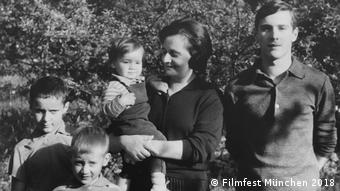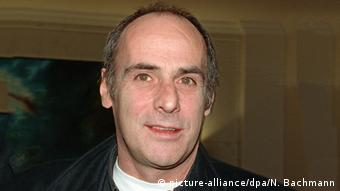The impressive documentary tells the life of a East German politicians and intellectuals family, and is a mirror of German history. Director Annekatrin Hendel in the DW-talking about the family, Brasch.

Scene from the movie
Deutsche Welle: “family Brasch” is a Film about German history, a Film about a German family, about German-German history – what has particularly irritated on the project?
Anne-Katrin Hendel: German history, German-German, the younger German history interests me in General. But the first germ-cell was actually the film adaptation of “The man” by Heinrich Breloer (2001). When I saw this, I thought, you would have to make an example of East German family to a movie. The fact that I knew many family members in person, I immediately. thought of that.
How did it continue?
I’m transferred in 2004 from the theatre to Film, Film producer and Director. And as of 2012, Marion., Roman “From now on peace is” about your family, I’ve secured the rights immediately for a feature film. I’ve been looking for people who the deceased members of the family, especially the parents knew each other. And so the thought came to me: when I meet these people, and it is very interesting persons of the time and all of them are history, then I have to make a documentary. So that means I’m doing two movies. The one, the documentary is now finished and the Second will be a feature film.

Early family happiness: Horst Brasch (r.), his wife, Gerda, and three sons
The year 1968 is currently on everyone’s lips – and also playing in your movie a large role. Your movie appears right now, is probably not a coincidence….
What runs as a major theme through the history of the family, Brasch, and through the whole movie, is the lack of communication between the generations. The data of the recent German history (1945 – 1968 – 1989) everywhere injuries. And since the year 1968 plays, the crushing of the Prague spring, a Central role. This year, rebel as everywhere in the world, the sons against the fathers ‘ generation. And also the. the conflict between the oldest son of Thomas, and the father breaks up. It’s now exactly 50 years, and because I think it is the right time to tell this story with all the consequences.
What you wanted to Express with the Film, in addition to the narrative of a very complex family history?
To me, it is important that you take the ordinary, archetypal process the dispute as a political, even if – or precisely because – it is happening within a family. And as one who is full of contradictions. So there, where it is particularly tragic, is also funny, and there, where it is particularly brutal, as it is particularly tender. Love and passion has played in the family plays an important role, just as alienation and loneliness. Since the Amplitude is large, both politically and personally. As it’s history for a century. What table is Shakespearean, of course, something very dramatic. The arrived here in Munich the audience. The audience welcomed the Film with open eyes, arms and ears.

Annekatrin Hendel
Your Film draws the portrait of a family, whose fractures and contradictions, the fractures in the history of the country, especially in the story of Thomas Brasch…
For me it is always interesting to tear things out of context. Thomas Brasch is, of course, as a writer, Director and Translator of the most famous son, and the conflict with his father is Central. But this functionary of the father has an origin, a history, as a Jewish child from the Nazis to London, emigrated, as well as the Jewish mother. Also younger brothers had conflicts with the father. But of which we know little. Thomas was there, as the Eldest, always the first. He is born in London. In 1945, almost in the “Zero hour”. He is boarding as the first sent into the Cadet, and has rebelled against it. He was in prison. Thomas was way ahead of his siblings always something negative as positive.
That was for the younger brothers, still a particular tragedy?
I do believe that the brothers and sisters in Thomas’ are shadows. The worst of it has hit the youngest brother, Peter, had the same conflicts with the father. And then “unfortunately” the writer was. A gifted, but “seen” he has never felt.

Was long on the side of Thomas Brasch and occurs in the Film as witness: Katharina Thalbach
My Film tries in total, with today’s questions for a moment of the Past. It was not less than the last big utopia, while at the same time, deep humanist Society of the father, the mutant with the anti-fascism was born out of the dictatorship. Both sides, both generations, believed in the possibility of a better world. Both sides took a desperate debate about which way is the right way. The young with hope, openness, and curiosity, until the reign of the Old abprallten. How big is the disappointment of the children must have been, shared the dream of socialism, but with the real-existing States could not accept.
Belongs to develop understanding for the young GDR?
What could be better than a new, fairer society? You have to imagine today. The old GDR functionaries were at that time very young. The lived their dream for the first time actually, and you succeeded for the first time is actually quite a lot.
Horst Brasch was a Communist, but he was also a Jew, to what extent this played a role?
It is a big, big story, in 1952, the show trials in Prague, the Jewish Communists were killed really by the own Comrades. What do you have for the young Horst in the GDR means? Horst was a Jewish Communist, and then another, of the non – came as many in the leadership – from the concentration camp, but from the English exile. He was also for a time under suspicion of spying for the West. And that also meant, for him, inevitably, risk. Whether he was with them later his children to know something, is not known. Probably is, that he fought many conflicts with himself. Maybe a reason for his Silence, which led to a lack of understanding of his children.
In the 1960s, there was a short flowering time, after the construction of the wall in 1961.
Yes, the time from 1961 to 1965, was the “short summer” of the GDR. Because many people, including intellectuals and artists believed, in fact, one could now build up undisturbed socialism and life. What emerged in this time, everything is in fantastic literature, art and films… Which were then banned after 1965. With the 11. The plenary session of the Central Committee of the SED in December 1965, where it was supposed to go to economic reform, I thought it was over then. Art and culture had to believe in it. Beginning in 1966, Horst became brash’s Deputy Minister for culture and had to enforce the sanctions against the artist. The so-called ice age began.

Thomas Brasch
How escalated in the coming years?
The misery took its course and culminated in 1968 in the violent act of military suppression of the Prague spring. Since a large fraction is created. Thomas Brasch distributed with his friends leaflets against the invasion. He was arrested in the family house. Father Brasch, lost his career and was moved to Karl-Marx-Stadt, where a little later his wife died. After 1968, it was in the GDR, then noticeably downhill, as well as in the family, Brasch.
The conflict with his father coined, but henceforth the work of the writer Thomas Brasch: “the fathers and the sons” to die in the programmatic title of his first narrative bands. The book is not in the sight of the first man in the state at all, and was not allowed to appear in the GDR. Thomas had to leave the GDR after the protest against wolf Biermann’s Expatriation in 1976, in the direction of the West along with his girlfriend, Katharina Thalbach and her daughter Anna. In the West, he started with his texts, plays and films. He went relentlessly with the social conditions in the East and the West in the criticism. Without regard to losses.
The next year, then what was of decisive importance was in 1989, the fall of the Berlin wall, which triggered the family?
The fall of the wall meets Peter and Thomas Brasch alike. The middle brother, Klaus Brasch died in 1980, on a Cocktail of alcohol and tablets. Both saw in the reunification of a missed opportunity at another company. Why, says Thomas Brasch crawl again, “hardly under the Rock of the party crawled (…) immediately ( … ), under the Rock of the Church or of the Registrar”?

Actors and creators of the film “family Brasch” with the Director in the middle at the Filmfest Munich for the world premiere
Also the alcohol played a major role?
There are always many reasons why someone drinks and takes drugs and destroys himself. But the destruction of this utopia, this dream, has made an additional contribution.
The focus is on the sister Marion, who lives as the only, the wrote about their family a novel, you know for 33 years – in addition to Thomas Brasch -. Your view shapes the Film.
The youngest daughter, Marion, who always sought reconciliation and balancing, and also in order to limits, Yes, she is the only one that survived their infamous family. It is still there. And how. The Film shows today in New York, the city that was for Thomas place. We will see how she presents her novel there. We experience them in Berlin, in the Studio, as a Radio presenter. With her daughter Lena Brasch in Berlin theatre. The history of the family, Brasch goes on.
The documentary “family Brasch” by Anne-Katrin Hendel starts the 16.8.2018 nationwide in the cinema. The interview was conducted by Jochen Kürten during the Munich film festival, where “family Brasch” world premiere.

